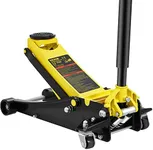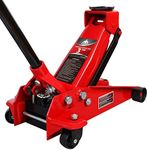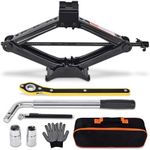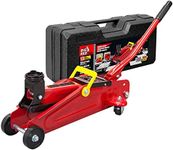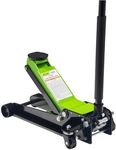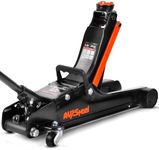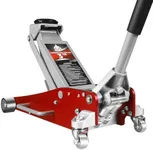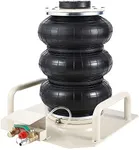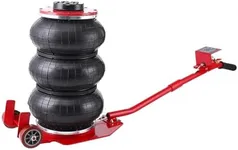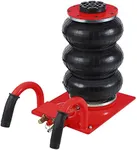Buying Guide for the Best Car Jacks
Choosing the right car jack is essential for safely lifting your vehicle for maintenance or repairs. The right car jack will depend on the type of vehicle you have, the kind of work you plan to do, and your personal preferences. Understanding the key specifications will help you make an informed decision and ensure that you have a reliable and safe tool for your needs.Weight CapacityWeight capacity refers to the maximum weight a car jack can safely lift. This is crucial because using a jack with insufficient capacity can be dangerous and cause the jack to fail. Car jacks typically range from 1.5 tons to 3 tons or more. For smaller cars, a 1.5 to 2-ton jack is usually sufficient. For larger vehicles like SUVs and trucks, a 3-ton or higher capacity jack is recommended. Always check your vehicle's weight and choose a jack that can handle it comfortably.
Lift RangeThe lift range is the height to which the jack can raise your vehicle. This is important for ensuring that you can lift the vehicle high enough to perform the necessary work, such as changing a tire or accessing the undercarriage. Lift ranges can vary, with some jacks offering a minimum lift height of around 3-4 inches and a maximum lift height of up to 20 inches or more. Consider the ground clearance of your vehicle and the height you need to achieve when selecting a jack. For low-profile cars, a jack with a lower minimum height is essential.
Type of JackThere are several types of car jacks, including scissor jacks, floor jacks, bottle jacks, and hi-lift jacks. Scissor jacks are compact and often come with vehicles for emergency tire changes. Floor jacks are more stable and easier to use, making them ideal for regular maintenance. Bottle jacks are portable and have a high lifting capacity, suitable for trucks and SUVs. Hi-lift jacks are versatile and can be used for off-road vehicles. Choose the type that best fits your vehicle and the kind of work you plan to do.
Material and Build QualityThe material and build quality of a car jack affect its durability and safety. Jacks are typically made from steel or aluminum. Steel jacks are strong and durable but can be heavy. Aluminum jacks are lighter and easier to maneuver but may be more expensive. Look for jacks with a solid construction, reinforced lifting arms, and a stable base. High-quality materials and construction ensure that the jack will last longer and perform reliably.
Portability and StoragePortability and storage are important considerations, especially if you need to carry the jack in your vehicle for emergencies or have limited storage space. Scissor jacks and bottle jacks are generally more compact and easier to store. Floor jacks, while bulkier, often come with wheels for easier movement. Consider how often you will need to transport the jack and where you will store it when not in use. Choose a jack that fits your space and mobility needs.
Safety FeaturesSafety features are critical for ensuring that the car jack operates safely and effectively. Look for jacks with features such as safety valves to prevent overloading, wide bases for stability, and secure locking mechanisms. Some jacks also have rubber pads or saddle protectors to prevent damage to your vehicle. Prioritize jacks with robust safety features to minimize the risk of accidents and ensure a secure lifting experience.
